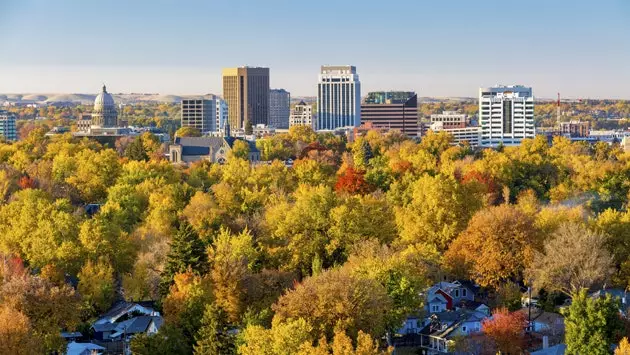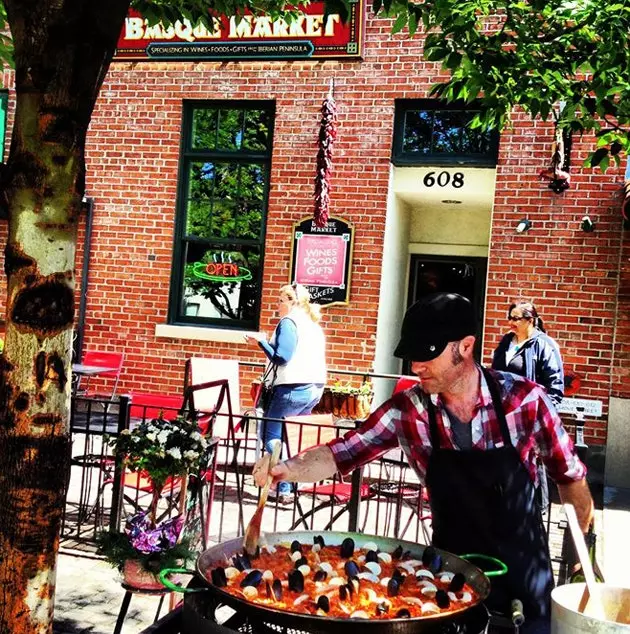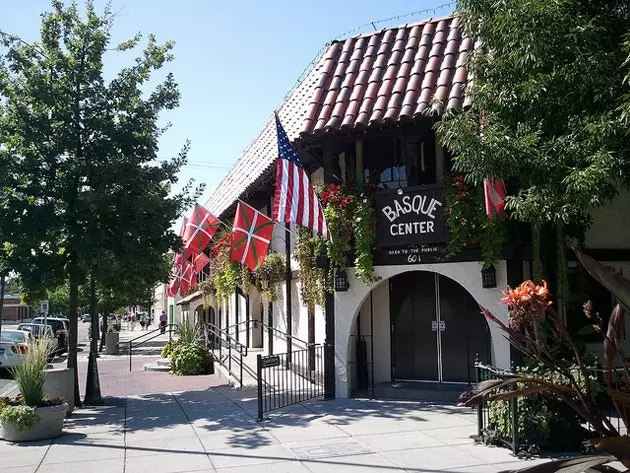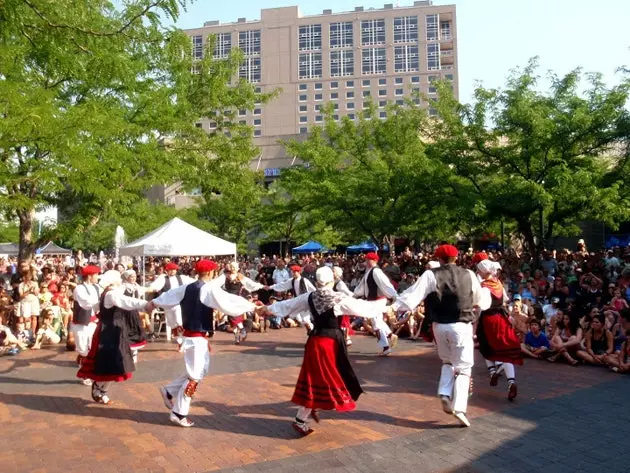
Boise, capital of Idaho, and of the Basque-American community?
The state of Idaho is a sort of Yankee version of the patriotic "Teruel exists" . Famous for not standing out for anything in particular, except perhaps for being the largest producer of potatoes in the United States, a scene from The Counselor it demonstrates the place that this state occupies in the American collective imagination. When Penelope Cruz and Michael Fassbender debate the safest destination to meet in secret, she doesn't hesitate: what better place than Boise (capital of Idaho). Why? Impressive, barely exploited natural landscapes, the authentic country feeling of the American West and the innate and unpretentious friendliness of its inhabitants: and totally integrated in this eminently republican land of cowboys, an active and influential Basque community.
HOW THE BASQUES CAME TO IDAHO
The first Basque immigrants arrived in Idaho in the late 19th century after the California gold rush , and they found in grazing their way of earning their bread. The figure of the Basque shepherd was soon associated with the values of honesty, work and effort among local farmers. The knockout effect did the rest, and not long after it was established an emigration line between Idaho and the Basque Country , in particular in the central-eastern regions of Biscay (not in vain, since 1993 the municipality of Gernika has been twinned with Boise) . Today, and according to US Census data since 1980 includes the possibility of selecting "Basque" in the section on ancestry , the Basque population does not reach 1% of the little more than a million and a half inhabitants of the state.

The paellas of the Basque Market, a classic in Boise
THE CONSECRATION OF THE BASQUE
Idaho Basque-Americans are not exactly a silent minority. They are not for many reasons, but the most notorious will surely be to have, in the heart of Boise (capital and main city of Idaho, population 200,000), an entire block dedicated to honoring Basque history, culture and identity. And the gastronomy, of course . Basques are people who eat well, even though they are third generation.
Two restaurants (Bar Gernika – Basque Pub & Eatery and Leku Ona – Fine Basque Dining); a grocery store, never better said, which serves as a tasting bar (The Basque Market); a museum (The Basque Museum and Cultural Center); a pediment ; and the meeting and socializing point par excellence of the Basque community, the Basque Center (The Basque Center) make up the officially named Basque Block. Staves with the music and lyrics of popular Basque songs, huge lauburus and rosettes with the surnames of the immigrants who arrived in Idaho decorate the pavement of the stretch of Groove Street between Capitol Boulevard and 6th Street.

Basque Center, epicenter of the Boise Basque Block
Although the visitor may be left with the idea that the Basque Block responds to a display of Basque bravado, the degree of mobilization and involvement of the community indicates that, beyond the exterior image, there is a sincere effort to preserve Basque culture, history and identity . And the work of each of the entities that make up the Basque Block is essential for this. Basque classes at three different levels in the museum, weekly rehearsals by the different Basque dance groups, monthly dinners in which some 300 people gather in the Basque center, tournaments in the fronton... The Basque museum is both a promoter of the ** Boiseko Ikastola ,** a daycare center that offers its study plan in Basque.
Belonging or having belonged to the **Oinkari, the main Basque dance group, is a sign of distinction for the Basque-American community**. At the 2010 Universal Expo, which took place in Shanghai, the Oinkari, invited by the Basque Government, were in charge of the exhibition of Basque folklore in the Spanish pavilion. An offer that perhaps not all Basque dance groups in Euskadi would have accepted. If something differentiates the Basque realities on both sides of the Atlantic, it is, with a few specific exceptions, their unequal politicization.

Basque dance in Boise
Around July 31, the feast of San Ignacio de Loyola, patron saint of Biscayans and Gipuzkoans, Boise celebrates its own San Inazios. Garlands that intersperse ikurriñas with American flags decorate the Basque Block during a weekend in which the Basque community of Idaho and a large part of the American West meet in Boise, festival of pop classics in Basque included, by the local group Amuma Says No.
Every 5 years, on the same dates, takes place Jaialdi, International Basque Cultural Festival ; the basque pride macrofestival. For a week, Boise becomes a Basque mecca , exalted in the form of cultural manifestations (dances, crafts, rural sports, music...), gastronomic and alcoholic; and that captivates a public that makes a pilgrimage to Boise not only from the Basque-American community, but from the Basque Country itself or even from other pockets of the Basque diaspora (from Argentina to Australia). In total, more than 40,000 attendees, when the registered Basques in Idaho are little more than 6,500.
CELEBRATE, EDUCATE AND PERPETUATE
No one who grew up in Boise misses the indisputable reality that, When it comes to having fun, the Basques take the cake. PJ Mansisidor , second-generation Basque, ex-member and ex-president of the Basque dance group and regular shovel player at the fronton, reveals the secret: “ It is not about the party for the party, but about the celebration of something that is important to us . Our ancestors arrived as immigrants and based on their loyalty and work, the Basques earned a good reputation from which we continue to benefit today. Personally, it is that heritage that I celebrate; and it is much more intense than a party that lacks a similar component”.
Mansisidor recognizes that this Basque pride is both a privilege and a responsibility. He considers himself lucky because, compared to other ethnic groups that also have particular historical links and differentiating features, in the case of Basque-Americans that heritage has not been lost, it is still alive. “Do you know how many Americans have ever told me that they would like to be Basque?” - boasts this engineer, three of whose four grandparents were born in Euskadi (the maternal grandmother was born on American soil days after her parents entered the country for the first time). But this privilege entails a duty of conservation: “Call it Basque stubbornness, but we are not willing to disappear in the annals of history. The satisfaction derived from contributing to the preservation of our identity, that pride, both individual and collective, is priceless. And it's worth celebrating."

Jaialdi Celebration in Boise
This 2014 marks the 10th anniversary of the Basque studies program at Boise State University, the main university in Idaho. John Ysursa, a second-generation Basque with a doctorate in History, is the current director of the Basque Studies Consortium. Interestingly, most of the students enrolled in the courses are not of Basque origin. For Ysursa, the festive component is sufficiently established, but he considers it important to continue working on education as a condition for the preservation of the Basque identity. “Celebrating plus educating equals perpetuating”, he repeats several times.
But, what justifies the existence of a study plan of these characteristics, which is carried out as part of the Faculties of Letters and Social Sciences, in an American university? Ysursa has no doubts: “In today's society, universities play a fundamental role. If we want to be taken seriously, we have to be present in the field of higher education ”. Without going any further, in the neighboring state of Nevada, the third in the union with the largest Basque population, the University of Nevada Reno also has a center for Basque studies.
THE BASQUE LOBBY
In this campaign to promote and preserve Idaho's Basque heritage, many sons of Basque immigrants have also played a significant role, climbing the social ladder to reach some of the political and economic helms in Idaho. Of Basque origin are a few politicians, bankers, businessmen and lobbyists , who from their influential watchtower propagate the Basque Country brand.
The mayor of Boise himself, David Beiter , second-generation Basque is, to be exact, the only Basque-speaking mayor of the United States . At a Democratic Party rally in Boise in 2008, the alderman had the entire audience chant **“Gora Obama!” (Long live Obama!, in Basque) **.
Dave Bieter - Gora Obama! from Guillermo (Bill) Yriberri on Vimeo .
But if there is someone who has stood out for his contribution to the preservation of Basque identity in Idaho, he has been Pete Cenarrusa. Died at the end of last September, Cenarrusa, the son of Basque emigrants, was the Longest-serving elected office in Idaho history – 52 years, 36 of which he held, uninterruptedly, the position of Secretary of State. An outstanding and respected republican leader, Cenarrusa used his influence to defend the cause of freedom of the Basque people , in which he firmly believed. In 1972, after his first visit to the Basque Country, he promoted a declaration that the Idaho legislature approved unanimously condemning Franco's dictatorship and demanding amnesty for Basque and Spanish political prisoners.
In 2002, Cenarrusa promoted another declaration that called for an immediate cessation of violence in Euskadi , condemned all terrorist acts and recognized the right to self-determination of the Basque people. The text was unanimously approved by the Idaho legislature, despite the diplomatic incident that originated with the Embassy of Spain in the United States and which required Condoleeza Rice's intervention , then National Security Advisor to the administration of President George W. Bush. Before Basque than Republican, Cenarrusa was also a patron and supporter of the implementation of the aforementioned Basque studies program at Boise State University.
The survival of Basque identity and culture precisely in the United States, origin of the homogeneous and dominant cultural model par excellence, might seem utopian, but in view of the level of involvement of the community, it seems that conservation is guaranteed for now. The fact that this diaspora has never questioned its identity in exclusionary terms also contributes to this: they feel American and Basque at the same time.
*** You may also be interested in...**
- Sister cities: reasons and curiosities
- Basque Country Guide
